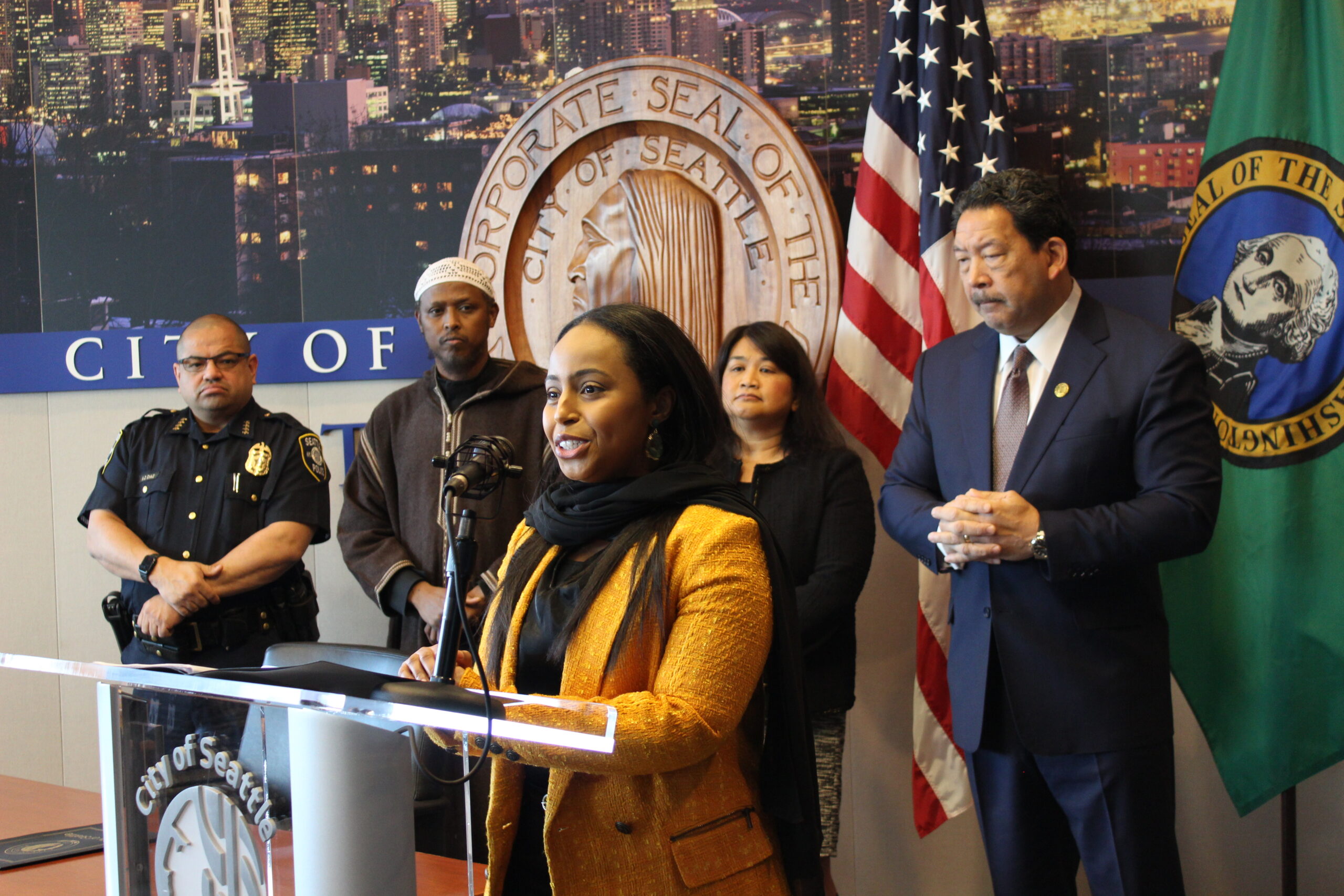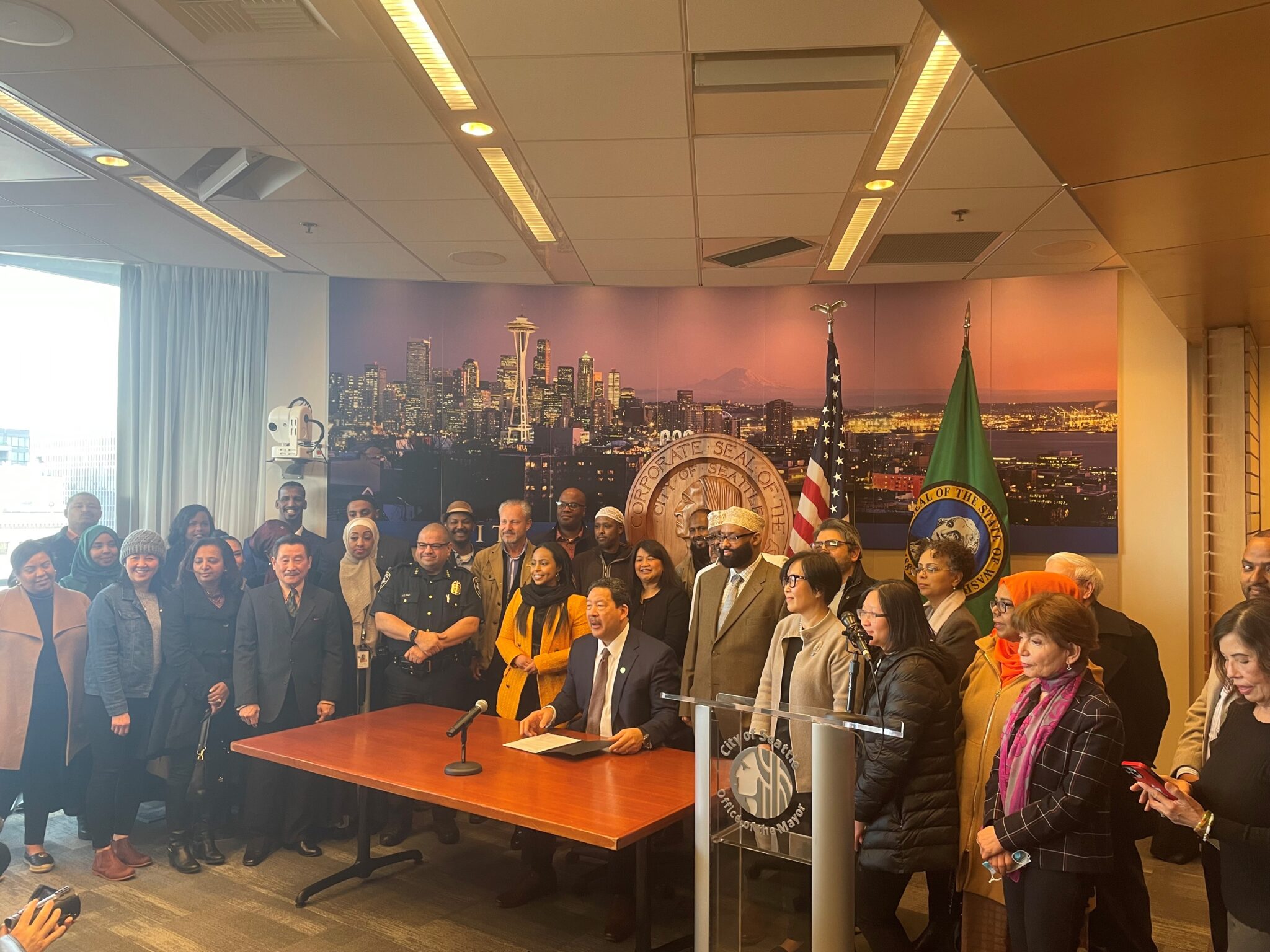
If you came to this page before reading Part 1: Before posting on social media what you think is ICE…, we highly recommend going here and reading that article first.
Our office semi-regularly receives reports from community members of ICE agents in Link light rail stations. Or we have noticed that every few weeks, local social media feeds are full of unconfirmed reports of ICE agents at stations. Sometimes the reports merely suggest the presence of immigration enforcement agents. Sometimes the reports even go as so far as claim that these agents are indiscriminately asking passengers for their citizenship. Both have been false.
We compiled this list of Frequently Asked Questions regarding this issue of ICE sightings at light rail stations and even on ferries. The intended audience for this FAQ are citizens who want to be positive allies. Many immigrants already know the information below 1) because much of the information below precedes the Trump Administration and 2) because the lived experience of being an immigrant in the U.S. already requires them to be knowledgeable about this system, a system that is outdated and antiquated. We hope this FAQ helps you become a more engaged and informed ally.
First, our disclaimer: This blog post does not provide legal advice and does not create an attorney-client relationship. If you need legal advice, please contact an attorney directly.
1. What are Department of Homeland Security agents allowed to do in Seattle?
Specifically regarding federal immigration enforcement, different agencies have different enforcement jurisdictions, and therefore have different powers related to enforcement. Within the city of Seattle, we are likely to encounter agents from any one of these Department of Homeland Security (DHS) agencies related to immigration:
- U.S. Customs and Border Protection (CBP)
- U.S. Immigration and Customs Enforcement (ICE)
- U.S. Coast Guard
ICE has two primary components: Homeland Security Investigations (HSI) and Enforcement and Removal Operations (ERO). Many in the immigrant justice community are familiar with ERO. Their agents are responsible for enforcing the nation’s civil immigration laws, (which are different from our criminal laws), and ensuring the deportation of immigrants from the U.S. who do not have legal status or whom they consider as “removable.” ERO deportation officers can operate anywhere within the United States, including within cities to identify, arrest, and remove immigrants who violate U.S. immigration law. Because they enforce civil immigration law, local law enforcement agencies (like ours) are not required to provide assistance to these agents.
Most community members are less familiar with HSI. These agents investigate and enforce a wide range of activities that are often related to immigration, such as human/drug/arms trafficking, child porn, import/export enforcement, and other issues related to national security.
U.S. Customs and Border Protection (CBP) agents have even broader powers. We briefly mention that in Question #3. We believe it is important for residents to understand these different divisions at DHS, so they know and understand the different kinds of agents they may be encountering throughout the city and state.
2. Who are those armed official-looking agents at Link light rail stations and at ferry terminals ?
The Department of Homeland Security agency called the Transportation Security Administration Visible Intermodal Prevention and Response team (TSA VIPR) routinely patrols light rail stations, ferries/ferry terminals, and other modes of transportation in cities across the country, including Seattle. They may look like this:

Here’s a TSA blog post explaining what they do: https://www.tsa.gov/blog/2016/11/28/tsa-job-vipr-team.
As you can see from the blog post image, they patrol armed and wear Department of Homeland Security-branded gear. It is in their job description to be “visible” and our Link light rail system is relatively new, so it may be unsurprising that many Seattle residents are very unaccustomed to seeing armed federal agents in their communities. While the TSA VIPR teams are within the Department of Homeland Security (DHS), it is significant to know that this is a separate agency from ICE.
3. Can immigration enforcement agents check people’s citizenship at any location and any time?
At any time, any federal agent can stop you and ask you about your citizenship status, (what is your citizenship?) or immigration status, (how did you arrive into this country?). AND it is important for you to know that the constitution guarantees your right to remain silent. Similar to criminal law, what you say may be used against you in immigration proceedings. In the immigration context, there is no equivalent to Miranda warnings or right to counsel. Regardless of whether you are a citizen or not, as long as you are within the U.S., you can invoke your right to remain silent to any enforcement agent. We encourage all community members to know their rights when stopped by an immigration enforcement agent on the street or at your place of work or at your home. The ACLU and the Northwest Immigrant Rights Project have helpful information here:
nwirp.org/resources/know-your-rights/
aclu.org/know-your-rights/what-do-if-questioned-about-your-immigration-status
There is a significant caveat here. Section 264(e) of the Immigration and Nationality Act requires all lawful permanent residents (LPRs, aka “Green Card holders”) over the age of 18 to have “at all times” official evidence of LPR status. So, if an immigration agent requests your green card, you must show it. If you’re over 18, please carry your immigration documents with you at all times. Again, if you don’t have immigration papers, you can say you want to remain silent.
Another caveat: CBP agents actually have very broad power near the U.S. borders, and the bar for what is considered a “reasonable” stop to inquire about your status is far lower than for the rest of the country. Border Patrol agents can question anyone within 100 miles of a U.S. land or coastal border about their immigration status, as long as they have a “reasonable suspicion” that the person may be in the country illegally. The videos circulating of agents boarding buses and asking for immigration status are usually CBP agents. This Vox article links to many of those videos and has their own FAQ about the legality of these bus stops.
4. Are there places or circumstances where people are protected from ICE questioning?
 In private locations, such as inside your home, individuals do not need to allow entry of an ICE officer unless that officer presents a warrant signed by a federal judge. As such, they do not need to answer any questions. In public, while no one is protected from being questioned by an ICE agent, your right to remain silent is a powerful one that can be invoked at any time. Though, even if you remain silent, you may still be arrested.
In private locations, such as inside your home, individuals do not need to allow entry of an ICE officer unless that officer presents a warrant signed by a federal judge. As such, they do not need to answer any questions. In public, while no one is protected from being questioned by an ICE agent, your right to remain silent is a powerful one that can be invoked at any time. Though, even if you remain silent, you may still be arrested.
Staying silent may be helpful for you because depending on the circumstances, ICE may not have sufficient information to justify an arrest and/or pursue removal proceedings if you do not provide or confirm information about your immigration status or country of origin.
It is important for community members to know that ICE has in the past detained people were actually U.S. citizens. And these victims have successfully sued the agency. It is worth mentioning again that immigration is a civil issue, so you are not guaranteed a lawyer in immigration detention and court.
5. But, I thought we were a sanctuary city/welcoming city?
We get this one a lot!
The term “sanctuary city” does not have a legal meaning and means different things, depending on the location and context. It generally refers to American cities or counties that protect undocumented/unauthorized immigrants from deportation by lawfully limiting cooperation with federal immigration authorities. Many prohibit City staff and/or local law enforcement officers from asking people about their immigration status (like the City of Seattle).
Different cities have different policies that they use to protect unauthorized/undocumented communities. Seattle has reaffirmed its commitment to respect the dignity of all its residents, regardless of status. It will do what it can within its power to protect immigrants. However, the terminology of “Sanctuary City” can often be misused, misinterpreted, or misunderstood. Anti-immigrant organizations and individuals often use the term pejoratively to anti-immigrant audiences to criticize cities like ours. To emphasize the true intent of Seattle, we prefer to use the term “Welcoming City,” which means all City departments prioritize and consider policies, actions, and practices that help immigrant and refugee communities succeed.
To also be more specific, regarding Seattle’s municipal code related to undocumented immigrants, we prefer the terminology of “don’t ask” policies. City employees “don’t ask” about immigration status. Passed in 2003, Seattle Ordinance 121063 instructs all City employees, including police officers, to refrain from inquiring about the immigration status of any person. One exception is when police officers have a reasonable suspicion of a felony criminal law violation.
Additionally, the “Welcoming City” Executive Order signed in November 2016 reaffirmed that employees will not ask about the status of residents and all City services will be available to all residents.
As long as the U.S. is a constitutional republic, federal officers from any agency have the power and jurisdiction to enter into any city to enforce their authority. We have not seen any city in the country successfully bar agents from properly performing their authorized duties.
6. What can I do to support immigrants in my community?
First, we recognize that many allies who report on social media seeing ICE in public usually have positive intentions. However, because of how easy false rumors about immigration enforcement can become exaggerated, the end result is that immigrant communities can become continually traumatized from hearing almost nonstop alerts from community members about ICE. We recommend reading this post with information from the Washington Immigrant Solidarity Network about allyship and reporting on ICE.
Also, if you find out that someone in your community is in need of immigration legal defense and they are income-eligible and live in King County or work in Seattle, then they may qualify for free legal defense through the Seattle-King County Immigrant Legal Defense Network. Click that link for more information. Translated flyers are available.
Finally, we have heard many stories of individuals unknowingly letting immigrant enforcement agents into their homes or accidentally sharing information. We recommend that all people, regardless of their citizenship status and immigration status know their rights when confronted by an enforcement agent. The ACLU and the Northwest Immigrant Rights Project have helpful information here:
nwirp.org/resources/know-your-rights/
aclu.org/know-your-rights/what-do-if-questioned-about-your-immigration-status



